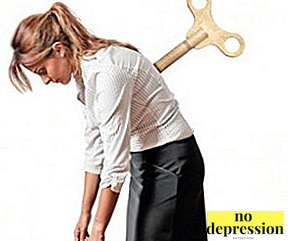Who among us at least once in his life did not feel that tired of his work?
It often happens that a person simply burns out and can no longer be productive.
His it's getting harder getting up in the mornings and going to work, and he doesn't understand why it is needed at all.
This condition may mean the presence of emotional burnout. This state carries with it a certain danger both for the person himself and for his professional activity.
What it is: a concept in psychology

Burnout syndrome - This is a condition in which a person feels a sharp decline in strength, constant fatigue and exhaustion (moral and physical).
It can occur as a consequence of chronic stress and, as a rule, most often happens in the labor sphere. But housewives also subject to CMEA.
After all, every day they have to do one and tighter routine work, which subsequently leads to the fact that they are simply disappointed in themselves and in life, and do not know what to do next.
People suffering CMEA gradually change for the worse. It seems to them that they are simply exhausted and can no longer do anything new or useful.
This condition is quite dangerous and often resembles depression. You can not let everything take its course, it is important to detect the problem in time and tried to solve it.
The reasons
Emotional combustion can happen to anyone, because in fact, for this there is enough reasonswhich we usually do not pay attention.
- constant stressful situations at work;
- intense work rhythm and work schedule, overtime work and irregular work schedule (it happens that you need to come to work earlier and leave later than expected);
- crush on the part of the authorities, the constant discontent of the boss;
- it happens that a person performs his work in the workplace, but also takes some of the work home;
- dissatisfaction with wages, the absence of any encouragement (not only material, but also, for example, praise);
- monotonous, routine, monotonous work;
- vague, fuzzy setting of tasks, lack of explanation of what is required to be done;
- low assessment of labor by the authorities;
- constant criticism, often undeserved and unconstructive;
- lack of sleep.

Most often, personality burnout syndrome occurs in people with these types of characters:
- maximalistswhich tend to have everything perfect and right;
- very responsible people and those who tend to put the public interest above their own;
- dreamer peoplewho tend to believe that they are perfect and everything works out for them, although sometimes this is not quite the case.
Also, people who have bad habits (alcohol, cigarettes, drugs) are subject to emotional burnout.
Factors

Most often, people from certain professions suffer from CMEA.:
- health workers;
- teachers;
- psychologists;
- social workers;
- law enforcement officials;
- service workers;
- people of creative professions.
Usually there are three factors that affect the formation of the CMEA:
- Personal - shows how the person is prone to emotions and experiences.
- Role - shows whether a person can be responsible for their actions.
- Organizational - responsible for the organization of work in the team.
Do health workers, doctors
Medical staff are included in the category of occupations that most susceptible to the CMEA. Every day they deal with sick patients who need attention and care.
Medical staff see it all and in some measure take on all the negative and hopelessness. Scientists claim that female medical workers most often suffer from the syndrome.
They realize that bear great responsibility for life and health patients, and to feel such a burden is very difficult, therefore, it is not surprising that burnout sooner or later, but comes.
At teachers

CMEA is also very common among teachers.
Teacher also bear a huge responsibility.
He should be an example of imitation, should educate and admonish children, give them knowledge, and also be able to keep well not only among students, but also among his colleagues.
To teachers usually very high demands. It's no secret that this work is very emotional. Children are different and are also a very problematic category, they need to be able to find an approach and endear themselves.
Therefore, on the teacher a lot of work is coming down in every sense of the word. It is also worth considering that teachers often have to take work at home and work overtime, not to mention the crush on the part of the authorities.
Stages
Now there is a very large number of variations of the stages of the CMEA. But among all of them there are four main ones:
- Tension - there are two options for the occurrence of tension: the first is the case when an employee doesn’t have any skills or abilities, the second is that the desired job disappointed and did not meet expectations.
In this case, the tension between the person and the environment in which he works and gives rise to the emergence of the CMEA begins to arise and increase.
- Stress - then a person can either find a way out of the current situation, or it will get worse and become chronic.
- Physical and behavioral changes - a person has physical, behavioral and emotional symptoms.
- Depletion - a person begins to feel emptiness and exhaustion, as if he is slowly fading away.
Symptoms
Emotional burnout has pretty long incubation period it does not occur in one day. Although sometimes it may seem that these productivity yesterday was at its best, but today it is suddenly becoming bad.
But this is not the case; it’s just that most people try not to notice the symptoms that they have for a very long time.

At first, a person feels that he has significantly diminished enthusiasm for workI want to do everything as quickly as possible, but it turns out just the opposite.
This means that it becomes harder to concentrate, because he is no longer interested.
All symptoms can be divided into three groups:
Physical:
- persistent chronic fatigue;
- lethargy throughout the day;
- feeling of lack of sleep;
- headaches;
- feeling weak in the body;
- muscle soreness;
- insomnia;
- heavy sweating;
- high blood pressure;
- pain in the joints and back;
- dizziness;
- weight change (may be excessive gluttony or vice versa, lack of appetite).
Behavioral change:

- decrease in desire to communicate with people, aspiration to be alone with yourself as often as possible;
- unwillingness to perform any specific action, evasion of duty;
- shifting responsibility to others;
- undeserved accusations towards others, attempts to blame them for all the troubles and failures;
- excessive anger and aggression, the manifestation of envy;
- constant complaints to others (for life, for poor work);
- negative and pessimistic thinking.
Psychological and emotional:
- apathy;
- indifference to everything that happens;
- self-disappointment;
- loss of faith in yourself and in your own strength;
- quick temper;
- disrupting anger on others;
- constant dissatisfaction;
- grouchiness;
- bad mood.
It is worth noting that the symptoms of burnout are often similar to the symptoms of depression. And as we know, the depressive state is quite dangerous and requires immediate treatment.
But the plus is that getting rid of burnout is much easier than depression.
Diagnostics
Techniques are applied:
- V. V. Boyko. Boyko has an interesting technique that will help you understand whether you have a burnout. This is a questionnaire that consists of 84 questions that only need to be answered "yes" or "no." As a result, you can determine the phase of your syndrome and then find out what symptoms accompany this phase.
- Maslach. Another interesting questionnaire that shows whether you have a professional burnout. It has a few fewer questions, only 22. You can also find out which of the three phases you are in. Here the answers should be given in the form of numbers, 0 means “never”, and 6 - “daily”.

Treatment
How to fight, how to get rid of emotional burnout?
Basically, the CMEA is treated with drugs with a herbal composition. First of all, prescribe medications based on valerian. It should be taken 1 month, one capsule, 2 times a day.
You can also take: ginseng, eleutherococcus, lemongrass other. It is worth paying attention to homeopathy, which is quite popular and effective.
The complex also treats depressions, sleep disorders and mood swings. Therefore, the doctor may prescribe antidepressants and tranquilizers.
It may be Cedariston, Nervohel other. If the syndrome is in its advanced form, it is prescribed potent drugs with a synthetic compound.
Do not forget about vitamins, biological supplements, natural phytotonics.
How to cope on your own?

Usually people ignore all the symptoms of the CMEA.
Such an attitude can lead to burnout to the chronic form, which will border on real depression.
If a person starts having problems with work on which he spends more than half of his life, then everything becomes gray and meaningless.
The first thing to do is take a vacation. Rest will help you to truly “reboot”, carefully consider your problems and finally decide what you need to change in your life and work.
Do some business, find interesting hobby spend more time with your family and friends. Reconsider your attitude to work, perhaps it is time you change or at least put forward some requirements and ask for better conditions.
It would be best if you consult a psychologist. It will help you cope with your problem, because it can be quite difficult to deal with the CMEA alone.
Try to take a piece of paper and write all the pros and cons of the work on which you are currently working. Probably, there will be much more minuses and you really should have just changed your place of work.
But if you are completely confused and do not know what to do, then better still ask for help.
Prevention
To avoid the CMEA need to seriously approach preventive measures. After all, proper prevention will help strengthen both physical and mental health.
Prevention of physical health:
- stick to a proper and balanced diet, eat as many vitamins as possible, limit yourself to fat, special attention should be paid to fiber;
- exercise, you can exercise easy, or at least exercise, if not possible, then at least be sure to walk in the fresh air;
- Healthy sleep is very important for health, so sleep is worth at least 8 hours;
- you need to make for yourself the daily routine and try to stick with it.
Prevention of psychological health:
- as they say, you cannot earn all the money, so you definitely need to rest, one weekend will be enough, but if you have the opportunity, you can do more (on this day you need to relax as much as possible not to think about work and only do your own personal business);
- analyze all that worries (you can use a pen and paper, you can talk to a person who listens or enroll in a psychotherapist);
- set the priorities correctly (you first need to do what is really important, and then everything else);
- do yoga or meditation;
- find yourself a hobby to devote all your free time to which you can always get distracted and relax.

All psychologists say that you need to learn to cope with losses, to survive them. In this case, the CMEA will not bother you.
Also it's important not to chase after what you can't catch. You need to try to do only what you really want and that is really important to you.
Burnout can be quite dangerous and often leads to very negative consequences. It is very important to pay attention in time to the existence of such a problem and to try in every way to organize your work activity.
Emotional burnout - how to regain energy:



